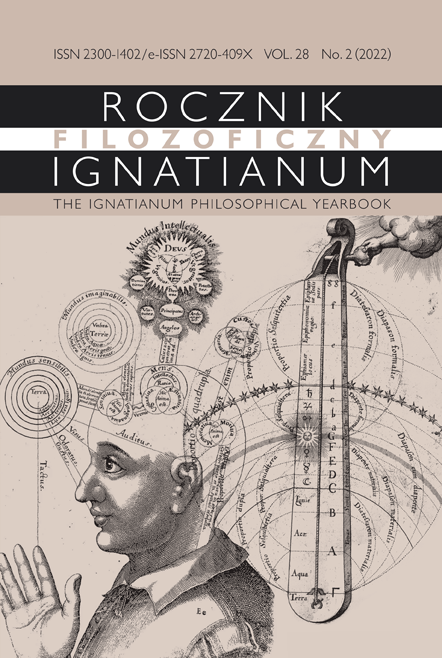Stanisław Ziemiański’s Natural Theology. Some Selected Topics
Abstract
In the article, I present or reconstruct and critically comment on the arguments for the existence of God given by Stanisław Ziemiański, S.J. Among these arguments, I distinguish between general-metaphysical, metaphysicalnatural and metaphysical-anthropological arguments. The main premise of the general-metaphysical arguments is the thesis of the non-necessity of linking existence with the various contents/essences of entities (existential/ radical contingency) and substantial or accidental forms with their subjects (essential/partial contingency). The guarantor of the occurrence of this connection is to be God as the entity, in which the relationship between the aforementioned factors assumes a necessary character. The metaphysical-natural arguments are not so abstract, but refer to certain data of cosmology (the Big Bang, negentropy) and biology (the origin of living organisms as self-replicating functional wholes). The appeal to God’s action is to explain these (in themselves) unique or unlikely events or phenomena. Other data are highlighted by metaphysical-anthropological arguments. Namely, these are the following common phenomena among humans: the desire for happiness, the sense of moral law, and the worship of the supreme being. According to the Author in question, the explanation of these phenomena only by reference to psychological and social factors is ineffective. On the other hand, they become understandable when we treat them as varieties of human references to the real existing God. In discussing the above arguments, I draw attention to the opportunities and limitations of theistic argumentation in contemporary philosophical discussions. The value of metaphysical-natural arguments depends on the changing state of scientific knowledge, and metaphysical-anthropological arguments depend on changing human attitudes. General metaphysical arguments are free from the above dependencies, but they seem too abstract for the contemporary reader.
References
Feser Edward, Scholastic Metaphysics. A Contemporary Introduction (Heusenstamm: Editiones Scholasticae, 2014).
Craig William Lane, “The Cosmoligical Argument”, w: The Rationality of Theism, red. Paul Copan, Paul K. Moser (London – New York: Routledge, 2004): 112–131.
Duchliński Piotr, W stronę aporetycznej filozofii klasycznej. Konfrontacja tomizmu egzystencjalnego z wybranymi koncepcjami filozofii współczesnej (Kraków: Ignatianum – WAM, 2014).
Ziemiański Stanisław, Teologia naturalna. Filozoficzna problematyka Boga (Kraków: Fakultet Filozoficzny Towarzystwa Jezusowego, 1995).
Ziemiański Stanisław, Spacerem po filozofii (Kraków: Petrus, 2011). Ziemiański Stanisław, Śladami życiowej i ideowej wędrówki znad Wisłoka nad Wisłę (Kraków: Ignatianum, 2021).
Kerr Gaven, „Author’s Response to Contributors”, Roczniki Filozoficzne 57 (2019) 4: 147–169, https://dx.doi.org/10.18290/rf.2019.67.4-10.
Piwowarczyk Marek „Trudności analizy faktu istnienia”, Roczniki Filozoficzne 65 (2017) 4: 61–91, http://dx.doi.org/10.18290/rf.2017.65.4-4.
Wojtysiak Jacek, „Jeszcze o istnieniu próba rekapitulacji”, Roczniki Filozoficzne 65 (2017) 4: 93–114, http://dx.doi.org/10.18290/rf.2017.65.4-5.
Copyright (c) 2022 Jesuit University Ignatianum in Krakow

This work is licensed under a Creative Commons Attribution 4.0 International License.
The Yearbook only accepts materials for publication that are free of all conflicts of interest, and that in no way involve conflicts over authorship, copyright, etc. The Editors will take action against any cases of plagiarizing, ghostwriting1, guest/honorary authorship2, etc. Where co-authored work is concerned, the Author listed first is expected to take responsibility for the submission, and is required to make clear the contributions of all of the Co-Authors involved. In the event of the publication owing its existence to funding dedicated to this purpose, this fact should be made clear: e.g. in any note of thanks/acknowledgement, or in a footnote, etc. Explicit notification should be given of any form of reprinting, with the appropriate evidence of permission to publish being furnished as required. Any impropriety on the part of Authors/Reviewers risks exposing them to appropriate responses from the relevant institutions.
______
1 This term refers to instances of a person who has made an essential contribution being omitted from the list of authors, or from notes conveying gratitude and/or acknowledgement.
2 This occurs when a person who has made either an insignificant contribution or no contribution at all nevertheless appears on the list of authors.





